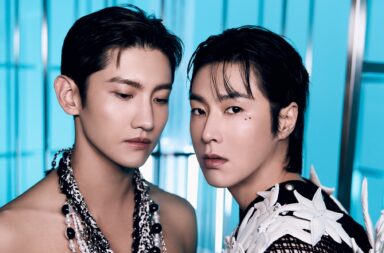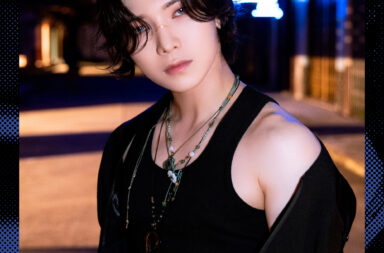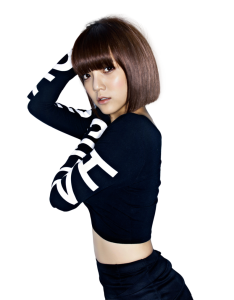 We hope you got in your picks for this year’s Seoulbeats March Madness event. This marks the first week of polls, so get on over there and participate!
We hope you got in your picks for this year’s Seoulbeats March Madness event. This marks the first week of polls, so get on over there and participate!
This week, we chose to focus on one of the categories in our polls: rap. It can feel like we talk about it all the time: useless rappers, ranking rappers, rap diss battles, Unpretty Rapstar, and even our own (pretty awesome) attempts at it. We all approach rap in different ways and can have strong opinions about it.
So this week, we asked our writers: what makes a good rapper? Who in K-pop, idol and otherwise, do you consider to be one of the better rappers and why? Why is there such a line drawn between “idol” and “authentic?” How did your standards influence your predictions for March Madness?
Mark: Since authenticity is such an important part of hip hop, it’s generally difficult to consider a rapper to have skill or talent if he/she does not possess some degree of authenticity. Which then begs the question: what is authenticity? To answer that simply, it’s characteristics that contribute to established hip hop archetypes such as being masculine, urban, and non-idol.
Rappers who don’t fall into this archetype, mainly idols, fight an uphill battle in order to receive validation and gain respect for their skills. But just because idols lack the authenticity element, doesn’t necessarily mean they lack the technical skills. Skill can be highly subjective but, to me, it is determined by the degree of difficulty in the raps executed. Degree of difficulty can be judged in many aspects including delivery, lyricism, content, and rhyme.
For example, Lil’ Wayne features great wordplay and wit in his lyrics, but his delivery leaves much to be desired. Part of the reason is because he doesn’t change speeds in his raps. If all you do as a rapper is rap slow, then it doesn’t show you have much technical skill. The degree of difficulty increases the faster you rap; enunciating becomes tougher and keeping with the flow of the beat becomes much more difficult. In this aspect, Zelo is much more skilled than Bang Yong-guk.
For me, the ultimate rapper is Eminem because he rates superbly in all aspects with unparalleled ability in delivery and rhyme. As for K-pop, I’ll go with Zico and LE because they’ve shown to have versatile deliveries and their songwriting abilities are well renowned.
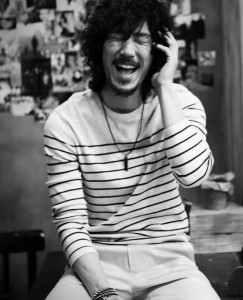 Cy: Firstly, to answer Mark’s initial question, I think “authenticity” is basically being yourself and not relying on a generic, stereotyped and/or costumed portrayal of “hip-hop” style. Artists like Tiger JK and Rap Monster have legitimate stakes in hip-hop — meaning, at the very least, they know the most vocal and well-respected proponents of the craft. They take their history and the history they’ve spent time to immerse themselves in and apply it to how they live their lives, and subsequently how they make their music.
Cy: Firstly, to answer Mark’s initial question, I think “authenticity” is basically being yourself and not relying on a generic, stereotyped and/or costumed portrayal of “hip-hop” style. Artists like Tiger JK and Rap Monster have legitimate stakes in hip-hop — meaning, at the very least, they know the most vocal and well-respected proponents of the craft. They take their history and the history they’ve spent time to immerse themselves in and apply it to how they live their lives, and subsequently how they make their music.
“Idol” rappers don’t fight an uphill battle because they don’t fit some prescribed standard of masculinity. They struggle because they have no aspirations of understanding what hip-hop is, and therefore aren’t serious about the actual art of rapping. If you’re not coming with realness, people who recognize real will automatically see it and have no time for you.
The elements of a “good rapper” are very simple: delivery, authenticity, content, etc. The foremost of these are lyricism first and performance second. That’s what the rap aspect of hip-hop culture is all about. It started with who could get the party hype (performance) and morphed into who had the lyrical adeptness to put everyone else to shame, who had a message that everyone could feel, and who had the wordplay to make people do a double-take (lyricism). Speed of rap is a minor aspect to me. Rapping fast, yeah, it’s impressive, but if what you’re saying is useless, your rap speed means absolutely nothing. Mos Def has a relaxed manner of rapping, but that takes nothing away from his lyrical skill and storytelling.
My history with hip-hop culture, and rap particularly, is what informed my choices in March Madness. There’s no doubt in my mind that the two best rappers for the guys are Tablo and Tiger JK. As far as the ladies, no one comes close to Tasha. There’s honesty and an unapologetic sense of self that pervades their music, something that I don’t see from most of the rappers on the list.
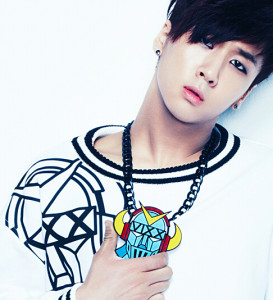 Taylore: I have really simple criteria for judging any rapper’s “authenticity” (a word which, I’m going to guess, differs from person to person). If a rapper doesn’t write his or her own raps, I can’t respect them as a rapper at all. That automatically disqualifies many idol rappers. I also take quality into account, so if someone is good at creating stories, painting vivid images, or coming up with witty lines, I’ll rate them higher.
Taylore: I have really simple criteria for judging any rapper’s “authenticity” (a word which, I’m going to guess, differs from person to person). If a rapper doesn’t write his or her own raps, I can’t respect them as a rapper at all. That automatically disqualifies many idol rappers. I also take quality into account, so if someone is good at creating stories, painting vivid images, or coming up with witty lines, I’ll rate them higher.
Of course, quality is a little more difficult to judge when it comes to Korean rappers due to the language barrier, but when I do get around to reading lyric translations I usually find that VIXX‘s Ravi has some of the nicest lyrics of all idol rappers. He isn’t exactly a popular guy, and not everyone thinks he’s a great rapper, but I really admire his skill at lyric writing.
Like Cy, I don’t particularly care too much for fast rapping. I tend to like rappers who put a lot of emotion into their rapping — I should be able to tell how you were feeling when you wrote your lyrics by the way you deliver them. Rap Monster is a favorite for me in this category, as are Tablo and Swings. Quality of voice is also really important for me, and there are rappers who I just can’t listen to because I don’t like their voices — regardless of their actual skills. Got7‘s Jackson and Mad Clown fall into this category, while others like B1A4‘s Baro and Bobby receive my love just because I like how they sound.
In the end, though, if someone shows a knowledge of hip hop that’s popular today, I am way more likely to call them authentic. Rap Monster is one of my favorite Korean rappers for this reason, since he’s cited some of my favorite US rappers (namely Pete Rock and C.L. Smooth) as influences. Even if someone has skill at rapping, I won’t be able to think of them as authentic if they don’t show an appreciation for hip hop as an art form.
Gaya: I am not very knowledgeable at all when it comes to rapping or hip hop as a whole; as long as there’s a good beat, or a mention of rolling buffaloes, I’ll probably like listening to it. That said, there’s an article on Seoulbeats which talks about the pillars of good rapping, which I have found myself using:
– Good Lyrics (word play, techniques, wit, good rhyme scheme)
– Good flow and timing
– Persona/attitude/charisma
– Good tone
This is definitely not a definitive guide, and I myself tend to pay less attention to tone and persona/attitude, especially with idol rappers. If it’s a cute concept, they’ll rap cutely; if it’s a darker or fierce concept, we’re going to see more of that typical fast-talking with their voice dropped low. And yes, my lack of finickiness over tone means that I really don’t mind AOA leader Jimin‘s chipmunk voice. It’s only when voices go squeaky due to a lack of control (looking at you, Yunho) that I have a problem.
 Cjontai: I have a thing for specific vocal tones when it comes to rappers, as well. I tend to like a natural deep bass, so Bang Yong-guk and Rap Monster appeal to me on that level. I also appreciate clever lyricists like Tablo because it’s one thing to write your own raps, but if you can insert a deep message into your words that’s even better. Stage presence is also great, but I don’t watch a lot of rap performances, because most times it’s a bunch of posturing and jumping around. I don’t expect anyone to bust out the B-boy moves, but I’d rather listen to the music alone if they’re only hyping a crowd by screaming “Put your hands up!”
Cjontai: I have a thing for specific vocal tones when it comes to rappers, as well. I tend to like a natural deep bass, so Bang Yong-guk and Rap Monster appeal to me on that level. I also appreciate clever lyricists like Tablo because it’s one thing to write your own raps, but if you can insert a deep message into your words that’s even better. Stage presence is also great, but I don’t watch a lot of rap performances, because most times it’s a bunch of posturing and jumping around. I don’t expect anyone to bust out the B-boy moves, but I’d rather listen to the music alone if they’re only hyping a crowd by screaming “Put your hands up!”
As far as authenticity is concerned, I want honesty in their storytelling. Don’t brag about owning luxury cars when you’re still taking the bus, or some garbage about struggling on the streets if you’re a chaebol — that tells me the rapper only views hip hop on a superficial level. I want to hear their stories from the heart, not what they think sounds like hip hop. It’s not always about dissing someone; it should be about communicating your true feelings. That is the entire point of all art.
If they’re only in it for the fashion, then I wish they’d call it cosplay instead of hip hop. It’s no different than a K-pop fan who doesn’t recognize the contributions of first generation idols like g.o.d. or Shinhwa. Have respect for the pioneers of the genre. That means acknowledging the works of Tupac, Warren G, Dr. Dre, Public Enemy, Missy Elliot, etc. My biggest problem with some rappers today is that they’ve forgotten the roots, which is disrespectful in my eyes. It’s an art form first before anything else and diminishing it to a caricature to gain “street cred” means I won’t accept you as legit.
Mark: We seem to all agree that authenticity is necessary in being a good rapper and that it’s also a quality that is completely separate from skill. Yes, you can be very talented in terms of delivery, rhyme, and wit, and completely lack authenticity. Likewise, your words and emotions may seem very genuine and representative of your background, but you may lack the technical foundation to capitalize upon the message you are trying to convey.
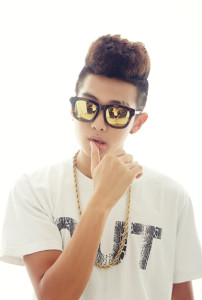 With that said, idols are inherently disadvantaged because the idol label is something they must overcome to achieve authenticity. To be fair, this is a reputation brought on by many idol “rappers” over the years who, like Cy said, care very little about the craft and are simply rappers because they can’t sing. However, that is not fair for the idols who are actually dedicated rappers. They constantly fight an uphill battle because not enough people are willing to give them a chance or take them seriously.
With that said, idols are inherently disadvantaged because the idol label is something they must overcome to achieve authenticity. To be fair, this is a reputation brought on by many idol “rappers” over the years who, like Cy said, care very little about the craft and are simply rappers because they can’t sing. However, that is not fair for the idols who are actually dedicated rappers. They constantly fight an uphill battle because not enough people are willing to give them a chance or take them seriously.
As for framing authenticity, I think it differs from person to person and I don’t think it’s as easy to spot as we may think. On a personal level, it’s about the raps which speak to you, and that in itself cannot be defined because every person’s background and bias draws them to different types of rap. Plus, it’s hard to truly measure whether a rapper is being authentic on stage because, as with any public figure, we don’t know whether his/her stage persona is in alignment his/her real-life self. To say that “rapper X really embodies his/her true self in the music” is similar to saying that “Ga-in is empowering because she owns her sexuality.” It’s all a matter of perception and perspective.
Cjontai: No, we may not be privy to their private lives, but I would argue that it’s disingenuous to put out a message in which you don’t believe. Just because you haven’t lived a hard-knocked life doesn’t mean you can’t draw from some experience from which you can identify. After that, it’s about how to deliver that story in a way that doesn’t make people question your sincerity. It’s about emotional connection. Do you believe in what you’re saying or not? Are you saying it just to look cool?
Powerful emotions speak to people. That’s what I mean by authenticity. Don’t try so hard to impress me; simply tell me what you feel without pandering. I loved Zico’s “Well Done” far better than “Tough Cookie” for that reason. He stripped off the grills and chains and simply told his story, his way, without hiding behind some misappropriated bravado. Why can’t we get more of that?
Willis: I love listening to rappers who are great storytellers. To digest their verses takes repeated listening sessions. Often, it requires deep reflection and further research to digest their lyrical content because of the complex references, double entendres, and intricate metaphors. While I appreciate K-hip-hop, it is ironically in the lyrics where I feel most disconnected as well. Since I don’t speak Korean, nor can I find many detailed translations, there is a lack of true appreciation and understanding that lies between the Korean diction used and what I can parse through. Someone can be rapping a line literally, but if it is packed with idioms, culturally specific references, or involves clever wordplay, an important part of the art will be lost on me. It’s a point that Jolly V tweets about in regards to a rap she did on Unpretty Rapstar (Warning: the link contains some spoilers, if you haven’t watched episode 4 yet).
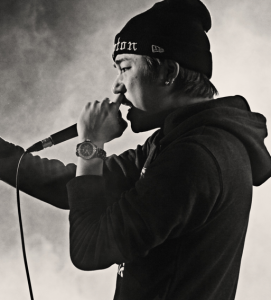 Like Cjontai, I would argue that authenticity involves honest content. If you are genuine with your words, then it is something that will drive what you write and how you convey it. I wouldn’t exactly call it unfair that idol rappers fight an uphill battle in convincing people of their authenticity because I don’t think this is exclusive to idol rappers. Non-idol rappers constantly strive to prove themselves and reaffirm their ability and authenticity among their peers and public. If an idol rapper is talented and real, then their talents will shine through in the long run as long as they continue to put out strong bars.
Like Cjontai, I would argue that authenticity involves honest content. If you are genuine with your words, then it is something that will drive what you write and how you convey it. I wouldn’t exactly call it unfair that idol rappers fight an uphill battle in convincing people of their authenticity because I don’t think this is exclusive to idol rappers. Non-idol rappers constantly strive to prove themselves and reaffirm their ability and authenticity among their peers and public. If an idol rapper is talented and real, then their talents will shine through in the long run as long as they continue to put out strong bars.
Andy: First, I have respect for those who have researched, digested, and internalized the history and culture of hip-hop. It’s not about chains, grills, etc. There’s a story behind the genre that people should respect. Hip-hop isn’t just some clothes you throw on for cred.
I think that some people forget that rap isn’t just talking fast and reciting some rhymes — this is particularly true for “idol rappers.” It’s music that tells a story of life. Which is why flow and style is something I look for. If you sound like you’re having a normal conversation, or like I do when I’m excited and talking quickly, I’m moving on. However, if you have a certain tone and emphasis on what you say, then I pay attention.
Likewise, if you are actually the one writing your words, you are given even more attention. Tell the story, make it matter. No, you don’t have to only talk about struggles, but if you only talk about lollipops and puppy love you aren’t going to gain any credit from me. The same goes for only talking about cars, drugs, and girls.
All these things are why I’ve always had a strong affection for Tiger JK and Tablo. They encompass what I see as “authenticity.” I BELIEVE in what they are saying and don’t think theynare just posing. If Zico would get away from that posing aspect (and stop being offensive), he could gain more respect — he already has the flow and lyrical prowess.
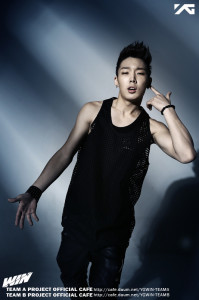 Hania: I enjoy listening to hip-hop and rap just as much as the next person, but ultimately, still feel pretty ignorant on the history and culture around it. That being said, authenticity, lyricism and how it actually sounds are things I pay particular attention to in rap.
Hania: I enjoy listening to hip-hop and rap just as much as the next person, but ultimately, still feel pretty ignorant on the history and culture around it. That being said, authenticity, lyricism and how it actually sounds are things I pay particular attention to in rap.
Like mentioned by the other writers, authenticity in hip-hop is a huge topic. Too often, we see someone simply throw some oversized jeans and some chains on, and profess to be a rap god. A rapper needs to be genuine about the genre, and understand the context of it too.
This ties into the lyrical skill, as meaningful rap lyrics leave a huge impact on me, often making me rewind the song just to hear a particularly stunning line again. This, of course, is harder when you’re listening to music in a foreign language, but looking up translations has quickly made Tablo my favourite rapper in terms of his lyrical content. What he writes is pure poetry, a meaningful scripture that goes beyond girls, fast cars and big egos.
Although fast rapping is not the only valid rapping style, I must admit I have a soft spot for intense rappers like Bang Yongguk, Rap Monster and Bobby. The sense of urgency they convey in their rapping style is exciting and attention-grabbing, though of course, the rapping style needs to be toned down according to the overall feel of the song. There are some rappers that I also love purely for the sound of their voice, like Exo‘s Chanyeol. Rappers who take a slower approach still create an intimate and intellectual atmosphere, which is gorgeous in some songs.
[youtube https://www.youtube.com/watch?v=ppR7s19c1RY]What do you look for in a rapper, readers?
(Images via Drunken Tiger, MFBTY, YG Entertainment, FNC Entertainment, Big Hit Entertainment, Jellyfish Entertainment)

